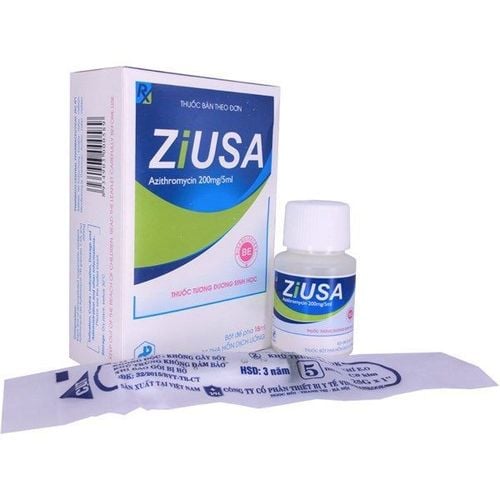This is an automatically translated article.
Rovalid 3.0 is an antibiotic that can be used in cases of infections in the respiratory tract, skin and genitals... Adhering to the indications, the dose of Rovalid 3.0 will help patients improve treatment efficiency and avoid unwanted side effects.
1. What is Rovalid 3.0?
Rovalid 3.0 is an anti-viral and anti-fungal anti-parasitic drug. Rovalid 3.0 has registration number VD-22712-15 and is manufactured by US Pharma USA - VIETNAM CO., LTD. Rovalid 3.0 contains the active ingredient Spiramycin 3,000,000 IU (3 million units) and is packaged as a film-coated tablet.
2. What effect does Rovalid have?
2.1 Rovalid uses and indications for treatment Rovalid 3.0 is indicated in the treatment of a number of medical conditions such as:
Respiratory tract infections: Pharyngitis, tonsillitis, sinusitis, acute otitis media, bronchitis laryngitis and pneumonia. Infection of the oral cavity. Skin infections. Genital infections. Toxoplasma infection in pregnant women and immunocompromised patients. Prophylaxis of meningococcal meningitis. Prophylaxis of recurrent rheumatic fever in cases of penicillin allergy. 2.2 Contraindications to the use of the drug Rovalid 3.0 Spiramycin is contraindicated in some cases:
Patients with a history of hypersensitivity to Spiramycin, other antibiotics of the Macrolid group or to any component of the drug. Children under 6 years old. 2.3 Rovalid 3.0 Side Effects Rovalid 3.0 Drugs rarely cause serious side effects. Usually, patients may experience some unwanted effects when using the drug such as:
Common: Nausea, vomiting, diarrhea, indigestion, .. (these symptoms are common when taken orally. ).
Uncommon:
Body as a whole: Fatigue, sweating, feeling of chest pressure or possible nosebleed. Gastrointestinal: Acute colitis. Temporary paresthesia, dysesthesia, grogginess, pain, muscle and joint stiffness. Skin: Skin rash, exanthema and urticaria. Rare:
Systemic: Anaphylactic reactions, superinfection due to long-term antibiotic use (oral Spiramycin). Heart: Prolongs the QT interval. If experiencing these symptoms, the patient should stop using Rovalid and notify the doctor for appropriate treatment.
3. Dosage of Rovalid 3.0
How to use Rovalid 3.0:
Oral medication. Patients should take the drug at least 2 hours before meals or 3 hours after meals because food in the stomach reduces the bioavailability of Rovalid 3.0. When using Rovalid 3.0, the entire course of treatment must be followed. Rovalid 3.0 dosage:
The following Rovalid 3.0 dosage information is for reference only. The patient should take the medicine as prescribed by the doctor.
Adults: 3 to 6 million units, orally 2 times/day or 1.5-3 million units, orally 3 times/day. In severe infections: Dosage 6 to 7.5 million units, orally twice a day. Children from 20kg and over: 1.5 million units/10 kg body weight, divided into 2 to 3 times/day. Prevention of meningococcal disease: Children: 1.5 million units/10kg body weight, divided into 2 times/day, used continuously for 5 days. Toxoplasma infection in pregnant women: 9 million units/day, divided into 3 to 4 times/day, orally for 3 weeks.
4. Interaction Rovalid 3.0 with other drugs
Rovalid 3.0 may appear some interactions with other drugs such as:
Taking Rovalid 3.0 at the same time with oral contraceptives will lose the effect of preventing pregnancy. Rovalid 3.0 reduces blood levels of Levodopa when administered concurrently. Rovalid 3.0 has little or no effect on the Cytochrome P450 enzyme system in the liver. Therefore, compared to the antibiotic Erythromycin, Spiramycin has less interaction with drugs metabolized by this enzyme system. To avoid interactions, before being prescribed Rovalid, the patient should inform the doctor about the drugs they are using, including functional foods. The doctor will base on that to prescribe the appropriate Rovalid.
5. Overdosage of Rovalid 3.0 and treatment
Overdosage of Rovalid:
The dose of Spiramycin is still unknown. When using high doses of Spiramycin, it may cause gastrointestinal disturbances with typical symptoms such as: Nausea, vomiting, diarrhea, may experience prolonged QT interval. However, the symptoms will gradually disappear when treatment is stopped. How to deal with Rovalid 3.0 overdose:
There is currently no antidote for Rovalid overdose. Therefore, the focus is mainly on treating symptoms. In case of Rovalid overdose, it is necessary to do an electrocardiogram to measure the QT interval, especially when hypokalemia occurs, and the QT interval prolongs congenitally. Combined use of certain drugs that prolong the QT interval and/or cause torsades de pointes. Missed dose of Rovalid 3.0 and treatment:
In case the patient forgets to take a dose of Rovalid 3.0, take it as soon as possible after remembering. However, in case it is almost time for the next dose, skip the missed dose of Rovalid 3.0 and take the next dose at the scheduled time. Patients should absolutely not use double the dose prescribed by the doctor.
6. Some notes and cautions when using Rovalid 3.0 drug
In the process of using the drug, the patient should be careful with some notes as follows:
Should be careful when using Rovalid 3.0 for people with liver dysfunction, because the drug can cause liver toxicity. Pregnancy: Rovalid 3.0 crosses the placenta, but the concentration of the drug in the fetal blood is lower than in the mother's blood. Spiramycin is not harmful when used in pregnant women. Lactation: Rovalid 3.0 is excreted in breast milk in high concentrations. Breastfeeding should be discontinued while taking the drug. Store at a temperature below 30 degrees Celsius, protect from light and keep in an airtight container. Rovalid 3.0 is an antibiotic used in cases of bacterial infections. Patients should not arbitrarily use antibiotics to avoid antibiotic resistance. Rovalid 3.0 should be used strictly according to the indications and instructions of the treating doctor. If you have any concerns, please contact your doctor or specialist pharmacist for specific advice.













